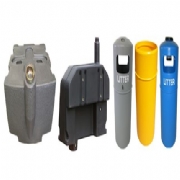 Add My Company
Add My Company
Sign In

Rota or Roto-moulding is a low pressure process for producing hollow, stress free plastic mouldings made predominantly from Polyethylene materials.
How does it work?
In its simplest form a tool is charged with a measured volume of powdered plastic, the tool is closed and rotated slowly in both the vertical and horizontal planes while heat is applied for a pre-determined time. The inside of the tool passes through this pool of powder and coats the inner surface, gently the now molten plastic sinters down to create a void free skin which when cooled produces the wall of the moulding.
Why should I choose Rotational Moulding?
Compared to other plastic moulding processes rota-moulding has many advantages. Its main application is in the production of hollow stress free mouldings with uniform wall section and often complex geometry.
The size of moulding achievable is another advantage Imagenta moulding routinely produce products from 1 litre in volume to 7000 litre, none of the current competing processes can offer this versatility.
When compared with blow moulding or injection moulding the investment required to produce a given shape in rota-mould tooling is significantly less, nominally one fifth of the cost. However it is rare that a rota-moulded design can be converted to an injection mouldable product without significant redesign or development and blow moulding often struggles with the complex shaped products that Rota-moulding thrives on.
Size restrictions
Currently Imagenta moulding equipment will handle products up to 3x3x3 metre products.
Production capabilities
As a general rule a single impression rota-mould tool is capable of producing 4500 units per annum. Normally to increase the output multiple tool sets are required.
Materials
The bulk of rota-moulded parts produced world wide utilise the versatile properties of Polyethylene in its many forms however it is also possible to produce Rota-mouldings in Polypropylene Polycarbonate, Nylon, PVC, EVA and EBA. For further details, visit the Materials page
For more information on Plastic moulding processes talk to Imagenta Moulding PLC
Enquire Now
List your company on FindTheNeedle.
